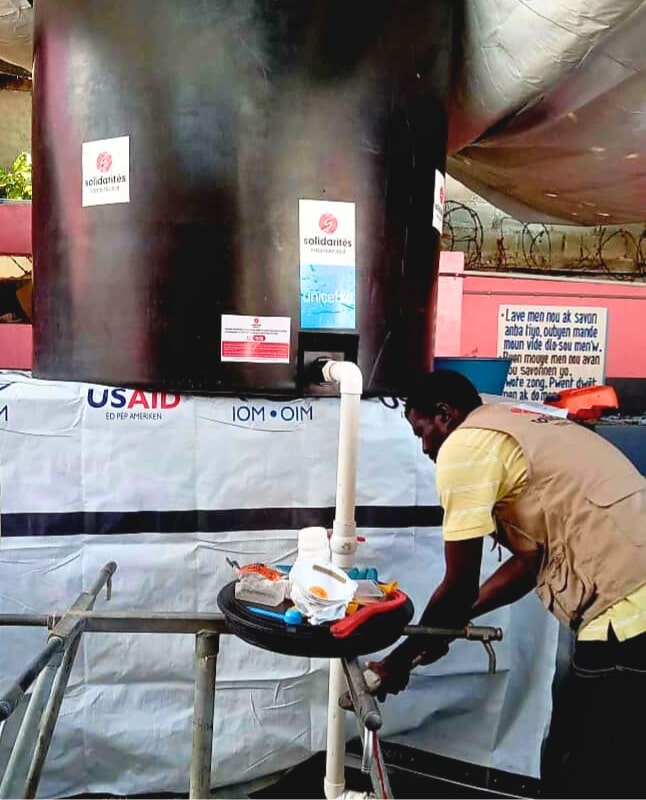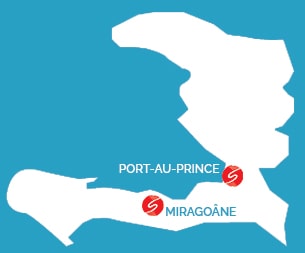Since our last update on February 19, 2024, the situation in Haiti has deteriorated considerably. Prime Minister Ariel Henry has just announced his resignation, and the humanitarian situation is worsening in the wake of the near-total takeover of Port-au-Prince on February 29. In the besieged capital, over 15,000 people have left their homes and had to fall back on emergency makeshift shelters. SOLIDARITÉS INTERNATIONAL is working in the field with displaced populations to alleviate the difficulties of access to drinking water and basic services.
On Monday March 11, Ariel Henry announced he would step down when a new transitional government was appointed. The announcement follows an unprecedented outbreak of violence on the island of 12 million inhabitants, with gangs now controlling large swathes of the country. “When you think about it, there are very few examples in the world where criminal gangs have taken over an entire capital, almost 100%,” points out François Flor, Country Director at SOLIDARITÉS INTERNATIONAL. In Port-au-Prince, since the end of February, gangs have unified and clashes with the Haitian police have multiplied. These confrontations have been coupled with simultaneous attacks on police stations, the storming of two prisons and the looting of stores. The authorities were forced to close the airport to prevent it falling into the hands of gangs, who had already been controlling the ports for several months. The scarcity of foodstuffs and fuel, due to the blocking of supply routes, and the forced movement of populations have led to fears of a worsening of the already alarming humanitarian situation.
A deteriorating humanitarian situation
Haiti
Context and action- 11.84 million inhabitants
- 163rd out of 191 countries on the Human Development Index
- 110.215 people helped
According to the International Organization for Migration, the deteriorating security situation has led to an increase of over 15% in the number of displaced persons in Haiti since the start of the year. In Port-au-Prince, where the situation is particularly tense, more than 15,000 people were forced to leave their homes in a single week at the beginning of March, the majority of them taking refuge in emergency shelters, often lacking access to water and basic services. In addition to the trauma caused by the violence, displaced people are forced to rely on potentially contaminated natural springs, or on private sources for which they have to pay, and thus lack healthy and dignified access to water, hygiene and sanitation. Such conditions create the risk of a resurgence of cholera and other water-related diseases.
Already active in the field for several years, SOLIDARITÉS INTERNATIONAL took emergency action at a school in Bois Verna, a district in the center of the capital, where 336 families spontaneously settled following the latest wave of insecurity. The NGO installed a 1,000-gallon (over 4,500 l) water tower for drinking water, supplied chlorination equipment and cleaning products, and trained three members of the site management committee in chlorine management. Every day, a tanker truck brings drinking water to the families.

An uncertain future
These interventions are carried out in a complex and changing context, hardly conducive to humanitarian support. François Flor deplores the “increasingly restricted windows of intervention for humanitarians” and stresses that teams have to carry out “day-by-day, hour-by-hour monitoring” to determine when an intervention is possible. Populations are in a situation of “permanent anxiety to see how things will go.“ Added to this political vagueness is the prevarication of the international community. With the support of the UN, Kenya announced in early March it would send police officers to reinforce Haitian forces. The resignation of the Prime Minister put this decision on hold until the political situation had stabilized. The situation now appears to be bogged down, and the population is paying a heavy price. If Haiti has long been “a forgotten crisis”, it now deserves more attention than ever. “I don’t know what the next few weeks or months will bring. The needs of the people are enormous. They require the international community to mobilize to raise funds and work together with local populations. A solution has to be found in an inclusive way, with punctual and framed international support, while respecting the will of the Haitian people”, concludes François Flor.
Photo : © SOLIDARITÉS INTERNATIONAL

